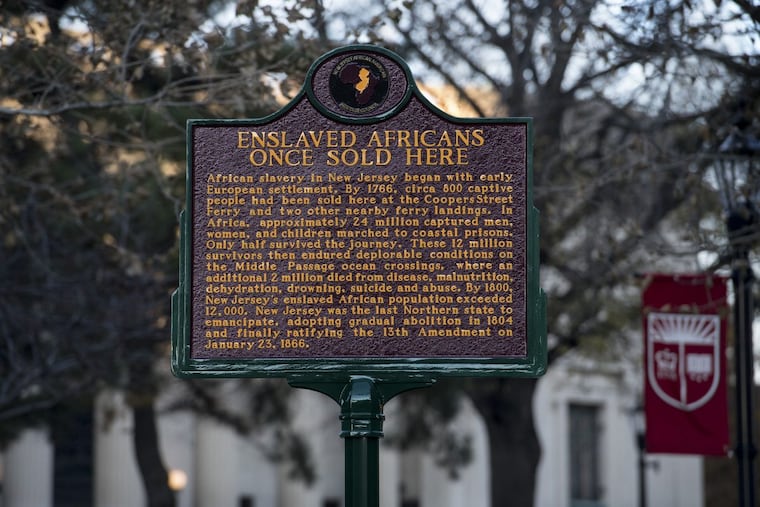Remembering Camden's ties to slavery with new historical markers
At least 800 slaves were forcibly brought across the Delaware River from Philadelphia to New Jersey in the 18th century via ferries owned by the slave-owning Cooper family.

More than 250 years ago, a ship carrying what historians believe were Camden's first African slaves arrived at one of the city's highly trafficked docks, Cooper Street Ferry.
On Monday, yards from Camden's first documented slave auction in 1727, outside what is now an arts center in Johnson Park, the city unveiled a historical marker — a move county and state officials said will counter a rewriting of history seen in today's politics and the current debate over Confederate monuments.
"Today, what we do is we tell the truth of who we are at a time where people are trying to push revisionist history," U.S. Sen. Cory Booker told a group of about 100 residents, county freeholders, and other officials, including U.S. Rep. Donald Norcross (D., Camden).
"What we do here echoes throughout our nation at a time of urgency when it comes to recognizing the truth of our country. … When you sanitize and you homogenize American history, what you do to it is, you lessen the greatness of our country," Booker said.
At least 800 slaves were forcibly brought across the Delaware River from Philadelphia to New Jersey in the 18th century via three ferries owned by the slave-owning Cooper family, among the city's founders. The ferries greatly shaped the region, with businesses and homes emerging around the terminals. Later on, activity on the Delaware River attracted industries such as Campbell Soup Co. and the New York shipyard.
While the Delaware River brought prominence and growth to Camden, Norcross said, it is also stained with "a sad history."
He pointed to the far-right rally in Charlottesville over the summer as underscoring the need for the historical markers in Camden. Activist and 32-year-old paralegal Heather Heyer was killed at the August rally, where neo-Nazis were protesting against the planned removal of a Confederate statue.
"Real American history, history that has facts, is starting to be interpreted a little bit differently," Norcross said. "How sad is that?"
Two more markers will be installed in the spring at sites where slaves were imported into Camden: the northeast corner of Federal Street and Delaware Boulevard, once the Federal Street Ferry, and the southeast corner of State Street and Delaware Boulevard, once the Cooper's Point Ferry.
Many of the slaves who were ferried from Philadelphia to Camden were forced to work on large South Jersey farms, said Camden County Historical Society board of trustees president Chris Perks.
"It's a story that not everyone knows. We're trying to bring attention to it," Perks said. "Right now, there's a surge of historical marking around this topic."
Over the last few years, the organization has flagged 20 sites in Camden with ties to slavery and the Underground Railroad. A $6,000 grant from the New Jersey Historic Commission allowed the group to begin marking the sites, along with help from the national nonprofit Middle Passage Ceremonies and Port Markers Project.
Most known information on Camden's involvement in the Middle Passage — a slave trade route between Africa, Europe, and America — comes from slave auction advertisements in Philadelphia newspapers in the 1700s.
The American Weekly Mercury printed Camden's first two documented slave auctions in 1727. Beginning in the 1750s, slave traders regularly began ferrying Africans to Camden's docks. In 1751, the Pennsylvania Gazette advertised the sale of a 26-year-old slave at the Federal Street Ferry. The ad noted that the unnamed man on sale "has had measles and smallpox." The ferry was owned by Daniel Cooper.
The ferry services continued into the late 1700s until slavery was abolished in New Jersey in 1804 — the last of the Northern states to do so.
But the markers are personal for Camden County Historical Society member Sandra Turner-Barnes.
Ten years ago, she learned through research that the Cooper family owned some of her ancestors.
She is also a descendant of Joshua Sadler, a Maryland slave who escaped in 1820 and helped found a community of former slaves in present-day Haddon Township. She read aloud a poem titled "Camden Slave Block," which she wrote 10 years ago after learning about Camden's slave sites.
Standing beside the marker, she said, "This is full circle for me."